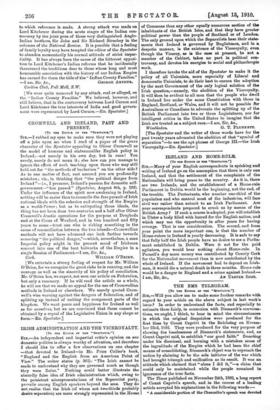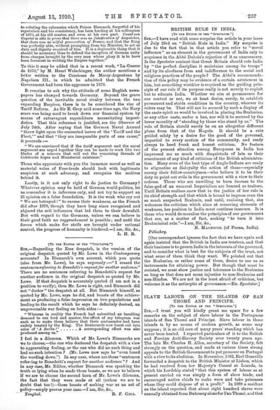THE EMS TELEGRAM.
[To TIM EDITOR OF MR "EITICTATOR."] Syne—Will you allow me to make some further remarks with regard to your article on the above subject in last week's issue? In order to understand the facts, and especially to estimate them fairly, in connexion with Bismarck's conversa- tions, we ought, I think, to bear in mind the circumstances in which the original de-apaches were produced for the first time by Count Caprivi in the Reichstag on Novem- ber 23rd, 1892. They were produced for the very purpose of showing the baselessness of Bismarck's statements, and, as Count Caprivi said, to establish "our good faith." Smarting under his dismissal, and burning with a mistaken sense of the ingratitude of the Empire which he had been the chief means of consolidating, Bismarck's object was to reproach the nation by claiming to be the sole initiator of the war which had brought triumph and unification as its result. It was an attitude which claimed that "alone I did it, "—a claim that could only be maintained while the people remained in ignorance of the true facts.
The Times published on November 24th, 1892, a long report of Count Caprivi's speech, and in the course of a leading article accepted his explanations in the following words:—
" A considerable portion of the Chancellor's speech was devoted
to refuting the calumnies which Prince Bismarck, forgetful of his reputation and his consistency, has been hurling at his colleagues of 1870, at his old master, and even at his own past. Count von Caprivi is able to prove that there was no falsification of despatches, that there was no toilful provocation of France, and that the King was perfectly able, without prompting from his Minister, to act as duty and dignity required of him. It is a deplorable thing that it should be necessary thus to defend the inception of German unity from charges brought by the very man whose glory it is to have been foremost in welding the Empire together."
To this it may be added that in a recent work, "La Guerre de 1870," by M. Henri WeLschinger, the author mentions a letter written to the Comtesse de Mercy-Argenteau by Napoleon III., in which he admitted that the French Government had been the aggressor in 1870.
It remains to ask why the attitude of some English news- papers has changed towards Germany. Beyond the grave question of the inevitable naval rivalry between the two expanding Empires, there is to be considered the rise of Tariff Reform. As Sir E. Grey said some time ago, the Navy scare was being used to break down our financial system by
means of extravagant expenditure necessitating import- duties. That this reference is justified, see the Observer of July 24th. After saying that the German Naval Annual "threw light upon the connected issues of the Tariff and the Fleet," and that "they are inseparable parts of one cause,"
it proceeds :--
"We are convinced that if the tariff argument and the naval argument are urged together they can be made to work like two blades of a scissors that will cut the remaining threads of Cobdenite hopes and Ministerial existence."
Those who appreciate with you the immense moral as well as material value of Free-trade should look with legitimate
suspicion at such advocacy, and recognise the motives behind it.
Lastly, is it not only right to do justice to Germany?
Whatever opinion may be held of G erman world-politics, let tie remember it is inference only, and not try to support an ill opinion on a false foundation. It is the weak who cry out "We are betrayed!" to excuse their weakness, as the French did after 1870, though they have long since recognised and
abjured the evil influences that led them to their downfall. But with regard to the Germans, unless we can believe in their good faith no rapprochement is possible ; and until the
forces which make for strife are brought under rational control, the progress of humanity is hindered.—I am, Sir, &c., L. H. R.







































 Previous page
Previous page